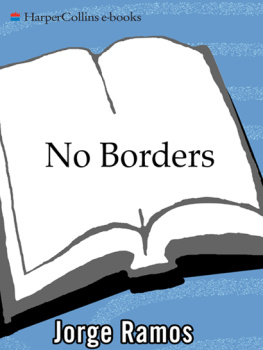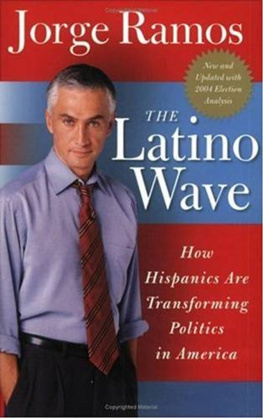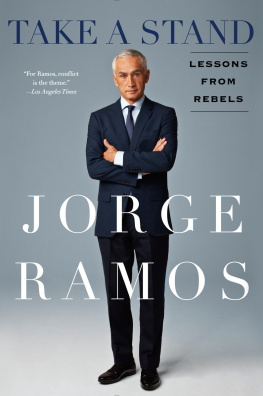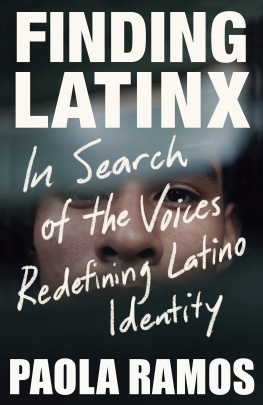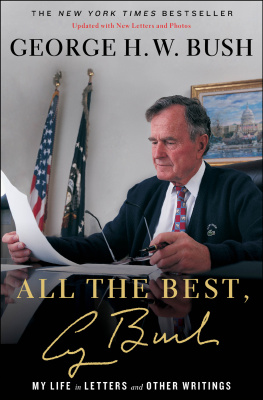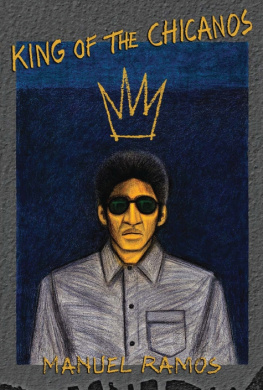TRANSLATED FROM THE SPANISH BY PATRICIA J. DUNCAN
A book is a victory.
PABLO NERUDA (ODE TO THE BOOK II)
I dont know what its like to write calmly. This book came together in the midst of interruptions, trips, changing homes, contract revisions, translations, soccer games and the demands put on my time from my other jobs as television news anchor, radio commentator, newspaper columnist and Internet contributor. Considering all this, the mere fact that I finished it is a victory in itself. Hence, the quote from Neruda.
What I regret most about writing this book is the time it stole from my son, Nicols. My first thanks go to him. Nicols is three years old, and he has brought new life into the house; his toys, his new words, his energy and his wonderful amazement at all things new fill every corner of the house. Sometimes Nicols would sit patiently with me, watching TV while I wrote. Those who say that writing is a lonely occupation are mistaken. In my case I wrote these memoirs to background music that included songs from Barney, Sesame Street and the Teletubbies, and under the glare of the restless eyes of Nicols, who waited for the happy moment when I would turn off the lousy computer so we could horse around. Even though you cant read yet, thank you, Nicols. I want you to know how much I liked the way you sang the ABCs in English as I recalled my childhood years. You were a great help in putting me in touch with that little boy in Mexico who my aunts would call ejote verde (string bean), and who I ceased to be so long ago.
My daughter, Paola, has kept me young with her dreams and adventures, and she has kept me awake after eleven oclock at night. Without you, Paoli, I would be behind the times.
Lisa, my wife, opened the spaces I needed in my already limited and busy family schedule in order to write. Thank you for understanding, and forgive me for the constant distractions. I hope this book captures the result of so many mental absences. Your love and your joy have been the greatest gift in my life.
This book is extremely unfair to my siblings, Alejandro, Eduardo, Gerardo and Lourdes, and to my parents, Lourdes and Jorge. It is impossible for me to recall my life without them; after all, we were inseparable for the first twenty-five years of my life in Mexico. They were my compasses. However, what I am relating herein are very personal impressions about the history that we shared. Surely my siblings and parents may have seen these experiences in a different light. But thanks to them I have never felt lonely, no matter where Ive been.
I cant say enough about Patsy Loris, who knows my work better than anyone. She spots my good and bad moods from a distance and criticizes what she doesnt like with an irresistible smile. Without her, my career as a television journalist would not have taken off quite so easily. Many of the events and interviews I describe here I either lived through with her or they were a result of her invaluable collaboration. First and foremost, however, she is my friend.
Univision has been extraordinarily generous to me. Workwise, I am like the Japanese employees of old who worked for the same company their entire lives. I have been with Univision since 1984, and still counting. Univision bought my ticket to witness history, and then it lent me the stage to tell what I saw. Their support of my work and understanding of my many journalistic concerns are priceless. A special thanks to Jerry Perenchio, Ray Rodrguez, Frank Pirozzi and Alina Falcn.
Tony Hernndez and Gustavo Pombo of the Latino Broadcasting Company (LBC) have been extremely generous for allowing me to explore on radio several of the topics that I cover in this book. My voice, my real voice, was first heard on the radio thanks to Tony and Gustavo.
Rosaura Rodrguez encouraged me to write my first book, and since the day we met she has not lost track of me. Along with Patsy, she read the first draft of this book. She knows how to listen like a magician, and she is an incorrigible freethinker. Her piercing observations have kept me honest with myself.
It may surprise my childhood friends Gloria Meckel and Benjamn Beckhart to receive a mention here. What did I have to do with this book? they might wonder. A lot, I would reply. We have lived parallel lives since high school, and they are my confidants. They help me change course when I am flying low, and like skilled air traffic controllers, they are always there at the most critical moments. Because of them, too, I do not feel lonely. They heard many of the stories in this book long ago.
Ever since I met her at a summer camp in Cuernavaca, Mexico, Kela Tern has been the greatest example of what it means to love life. Sometimes I felt that without her energy the world would come to a stop. No illness has been able to stop her, and her enormous, solid faith is still something I do not comprehend. Thank you for the encouragement, Kelita.
Bill Adler, my agent, sent me a very tempting letter full of possibilities. He didnt know me, but was up to the challenge. That letter would eventually prove to be a springboard for me, allowing me to jump from Spanish to my first two books in English.
Rene Alegria of HarperCollins was quick to seize the idea of showing the rest of America what an immigrant journalist or a journalist immigrant does and what he thinks. He has guided me in this editorial adventure gently but firmly. When I handed Rene the first draft of the book, he returned it to me with hundreds of comments and some words of advice: Now write all that you are holding back. Thanks to his intuition and his almost psychological ability to analyze, not to mention his sharp eye, I discovered things about myself that I had hardly thought about before. Rene opened the doors that I wanted to keep shut.
My very intense yet gentle conversations with Teresa Rion left their mark, from the very beginning, on what I have written herein. She opened pathways to feelings that I didnt even know existed. These pages represent the times that she was there and those that she wasnt: some of them tender, and some of them very difficult to handle. As far as they concern me, they were all of the essence.
Dennis Farney will never know what his article in the Wall Street Journal meant for my career in the United States. Thanks to him, I decided to write this book.
Lastly, the chapter about the war against terrorism was written in memory of those journalists who died in Afghanistan in 2001, when I was covering the conflict: Johanne Sutton, Pierre Billaud, Volker Handloik, Harry Burton, Maria Grazia Cutuli, Julio Fuentes, Aziz Haidari and Ulf Stormberg.

